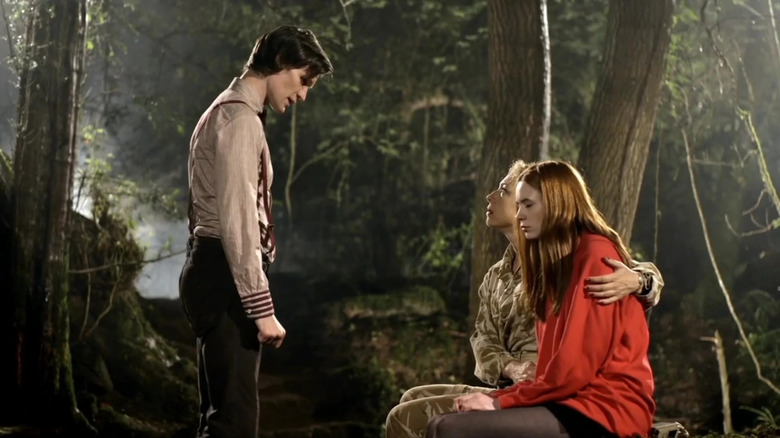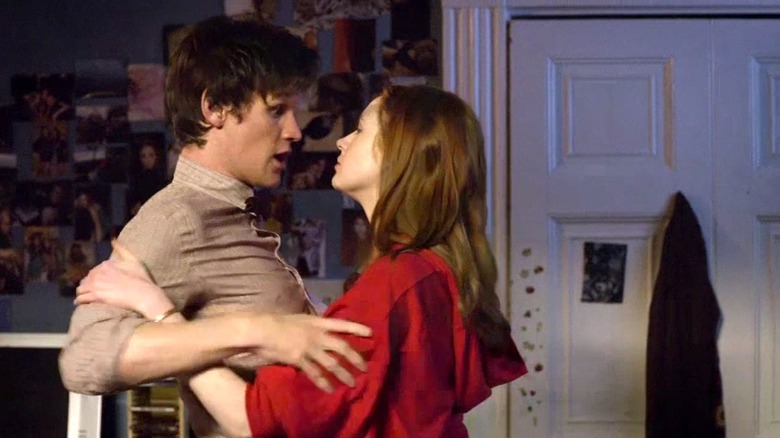The One Doctor Who Scene Steven Moffat Wishes He Had Scrapped
Everyone's got their favorite era of "Doctor Who," and the era with Matt Smith's Eleventh Doctor and Karen Gillan's Amy Pond is a popular one. It was also the first period of the show where Steven Moffat had taken over as showrunner. His debut season is often considered one of the strongest in the revival "Doctor Who's" run, but there's also one moment early on that has rubbed viewers the wrong way: the ending to "Flesh and Stone."
"Flesh and Stone" was the second half of Eleven's first two-part story on the show. It was a story centering around the famous Weeping Angels, an alien race that can move at super fast speeds, but only if no one's observing them. It also featured the return of River Song (Alex Kingston), a character who made a strong impression in her first (and at that point, only) appearance in season 4. It was a story with a lot of hype behind it, and near the end of "Flesh and Stone" it seemed to be living up to that hype. There were a lot of great character moments for Amy, River, and Eleven, and the villains were defeated in a way that was both cool and not a deus ex machina. ("Doctor Who" has a lot of those.)
But with everything seemingly wrapped up, there were still a couple more minutes left in the episode. What did Moffat choose to do with that time? He had Amy try really hard to seduce Eleven, even though Eleven's clearly not interested and she's supposed to marry her fiancé in the morning. It's a moment that makes Amy look kind of terrible, especially in light of how much fans would come to love Rory (Arthur Darvill).
'It doesn't work'
As it turns out, Moffat isn't happy about the scene either. "I don't like Amy coming on to the Doctor at the end of 'Flesh of Stone,'" he explained. "I mean the idea is good and sound — young girl reaches out after hours of deranging terror. But I played it for 'Coupling'-style sitcom laughs. And it doesn't work."
"Coupling" was a sitcom Moffat ran in the early 2000s about six friends in their early 30s; it was basically a British "Friends," but raunchier and more smartly written. Moffat's skill for writing quippy dialogue with a lot of innuendos can be seen a lot throughout "Doctor Who," but this scene was a clear case of him leaning too hard on it. "Flesh and Stone" ends with Amy trying her hardest to cheat on her sweet and faithful fiancé, but the show never makes any attempt to treat it with any sort of seriousness. It results in making Amy look pretty cold and unsympathetic, and undermines the idea that Rory and Amy have a once-in-a-lifetime sort of love, which the rest of season 5 (and 6 and 7) lean pretty hard on. Moffat is frustrated looking back at the scene, because the rest of the episode was pretty great:
"Love the Doctor's coup de grâce, the scene on the beach with River – even the moment when we cut to Amy's house feels grand and epic. And then I screw it up with sniggering sex comedy. Bah! [Script executive] Lindsey Alford (as she was then) called me out on it, and I disagreed and stuck to my guns. And I was wrong, damn it."
Some other questionable writing choices
This wasn't the last time Amy and Rory's relationship was written in a weird way, however. The season 6 premiere also had an iffy subplot in which Rory overheard a captured Amy talking to (presumably) Eleven. "I love you. I know you think it's him. I know you think it ought to be him. But it's not, it's you ... My life was so boring before you just dropped out of the sky."
It later turns out she was saying this to Rory, not Eleven, but come on: dropped out of the sky? That's a very strange figure of speech to use for someone you've known throughout your childhood. The subplot has a clear purpose in that it shows Rory working through his insecurities, but it relies on giving Amy unnaturally misleading dialogue to pull it off.
Another moment that rubbed some fans the wrong way was the season 7 premiere, "Asylum of the Daleks," which opened with the reveal that Amy and Rory had gotten divorced between seasons. Luckily they get back together by the end of the episode, but the reasons for their divorce (mainly that Amy felt that Rory wouldn't be happy with a wife who couldn't have kids) were fully worked through within a single conversation. Amy and Rory's undying love for each other may be the core of so many of their storylines, but if these episodes are any indication, they really needed to work on their communication skills.
Conflict based almost entirely around miscommunications works great for a sitcom like "Coupling," but less so for storylines like these that should be taken seriously. As great as the Eleven era of the show was, there were definitely a few moments I wish Moffat could've scrapped.


